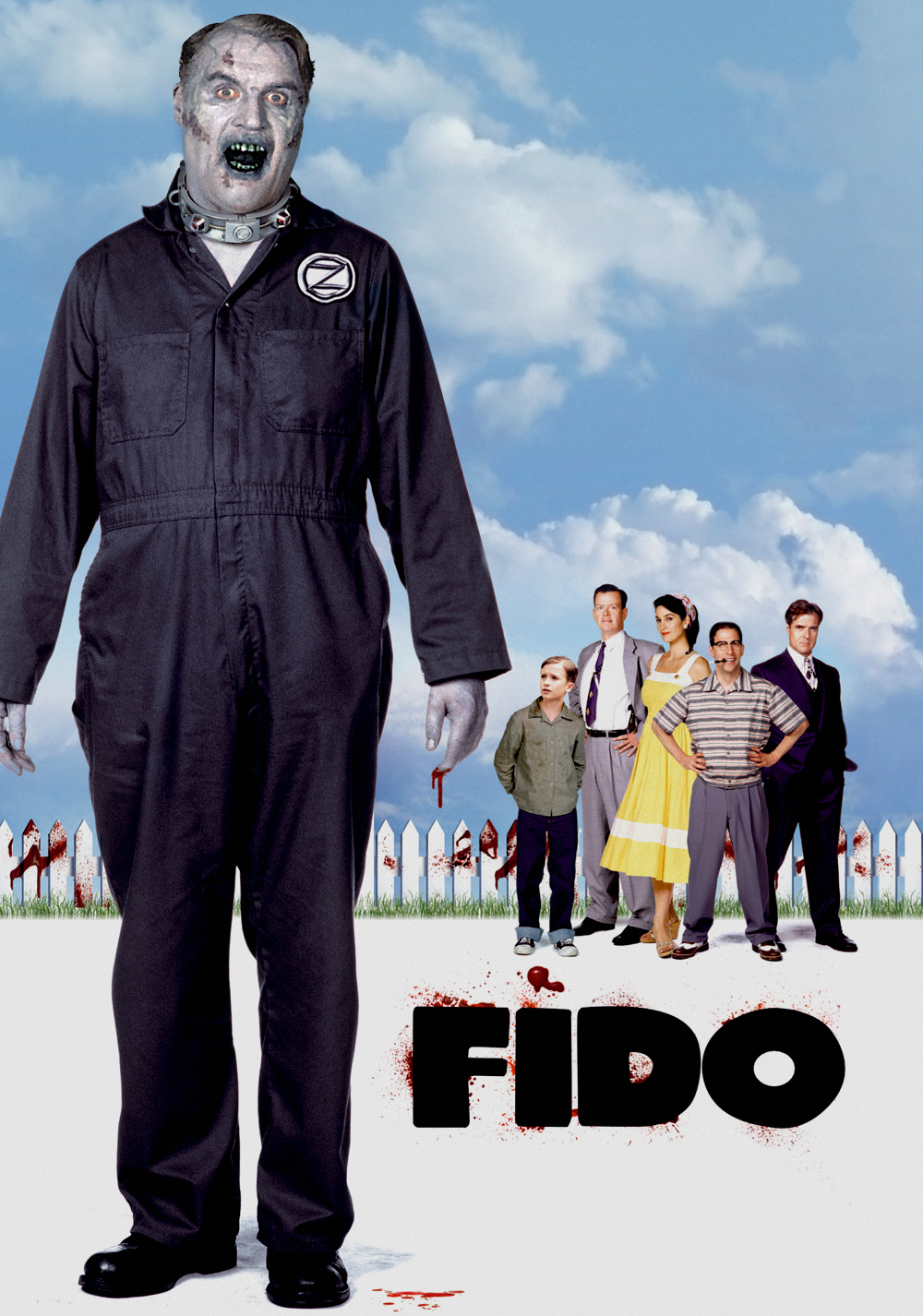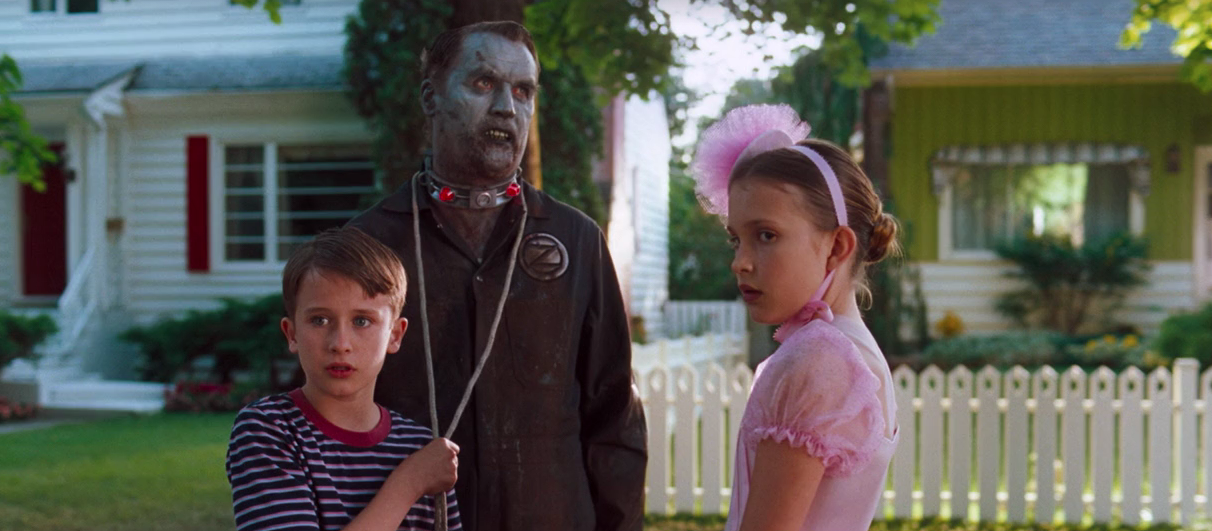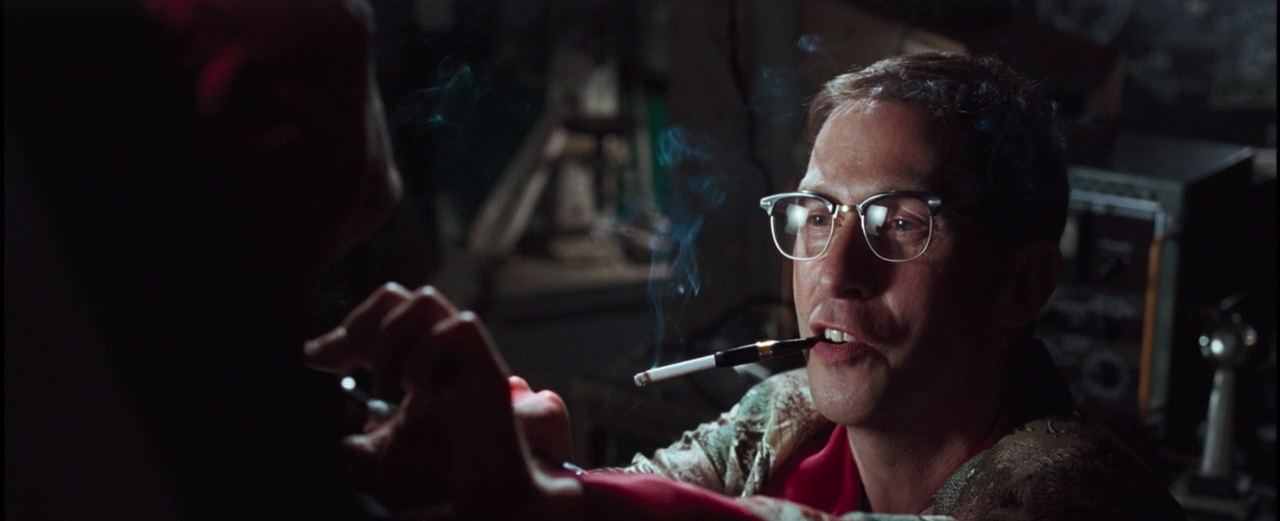

“In the brain and not the chest. Head shots are the very best.”
Horror-comedy has always been a fun way for intelligent filmmakers to do social satire—think cult favorites like The Stuff, They Live, and Dawn of the Dead. Approaching Romero’s tradition of critiquing consumerism through the zombie film, Andrew Currie’s Fido adds a fresh wrinkle to the proceedings by making zombies themselves a commodity—a status symbol for the rich. Our zombies here are the standard flesh-eaters that you’ve come to expect from the genre made docile by a specially designed collar that renders them harmless. Set in the 1950s, it gets most of its chuckles from caricaturing the bygone cultural era, spoofing the zombie genre, and exploring the weird consequences of owning zombies as pets. It manages to gross you out, charm you, and make you laugh on a consistent basis, consistently punching well above its weight class. While it may feel slightly derivative due to the popularity of Shaun of the Dead—it’s basically the last gag from that movie stretched to a feature—its unique spin gives it plenty of opportunity to be a success.
A black-and-white propagandized newsreel kicks things off by explaining all about the Zombie Wars and how the ZomCon corporation sprung into existence to address the issue. Not only did ZomCon erect the fences that protect the communities from The Wild Zone (where radiation and uncollared zombies preclude human activity), but they also developed the collars that allow zombies to be domesticated. Now they’re in charge of running the nanny state. While most people use their zombies as third-rate house-servants, Timmy Robinson (K’Sun Ray) basically treats Fido (Billy Connolly) like he would a dog. They play fetch, Timmy affectionately refers to him as “Boy,” and he washes him off with a garden hose when his collar malfunctions and he starts ripping at Mrs. Henderson’s innards.

The reason that Timmy bonds so quickly and tightly with Fido is that he hasn’t made many friends and his parents are terribly neglectful. His father, Bill (Dylan Baker), had to kill his own father during the Zombie Wars and he has carried that trauma with him into adulthood and allowed it to affect his relationship with his family. He’s so mentally cloudy that he doesn’t even realize that his wife has been carrying their second child for months. Meanwhile, Timmy’s mother, Helen (Carrie-Anne Moss) is more concerned about keeping up with the Joneses than caring for her son, more often berating him for his physical appearance and how his choices will affect their social standing than for actual misbehavior. Fido, whose communicative ability is reduced to grins, groans, nodding and pointing, serves a versatile role as pet, substitute father, and potential love interest for Helen.
Timmy is immediately presented as more thoughtful and sensitive than his peers when he asks the ZomCon head of security, hero of the Zombie Wars Jonathan Bottoms (Henry Czerny), if zombies are dead or alive. Bottoms, whose family has moved in next door to the Robinsons, gives him the runaround and avoids the moral dilemma. The scene indicates Timmy’s social isolation by contrasting him with two brown nosing psychopaths (Aaron Brown and Brandon Olds)—a pair of brothers who seem way too eager for people to become zombies so they can fling some lead. But there is a glimmer of hope for friendship in the form of the new girl, Cindy Bottoms (Alexia Fast). During outdoor training at school, where the kids send bullets down range and do sing-along chants about the preference for headshots, she proves to be an adept marksman. There’s a cute little love-at-first-sight shot where Timmy pulls his goggles down in slow motion and gazes at her in awe.
The death of Mrs. Henderson inevitably leads to a zombie outbreak inside the fortified confines of the city. This escalates into an unexpectedly touching storyline where Fido is separated from the Robinsons and sent away to work at the ZomCon factory. Cue a rescue mission, a path to redemption for the cowardly Bill, and a grotesque happily-ever-after for the rest of the fam and the weird collection of neighbors that surround them.

Aside from the introduction of zombies, which tends to twist every convention to some degree, Fido follows a fairly standard storyline. The 1950s melodramas of Douglas Sirk (All That Heaven Allows, Magnificent Obsession) are cited as key inspirations along with the zombie films of Romero. But Fido doesn’t hang its hat entirely on its intentionally spoofy plot. Instead, it is the moments of knowing satire, subtle subversions of expectations, and the absurd outcroppings of the central premise that make it so much fun. These elements often overlap and bubble up into some very bizarre moments, such as Bill’s penchant for attending the funerals of strangers for the satisfaction of seeing their “head coffins” dropped unsanctimoniously into their graves, or Cindy Bottoms still calling her zombified father “Daddy,” or children being instructed to shoot their grandparents if they fall and get back up. Lots of little tropes warped into absurdity.
Considering the silliness of the film’s setting and premise, its success hangs on the cast’s ability to tightrope between camp and melodrama. Carrie-Anne Moss does a wonderful job of teetering on the divide, while Dylan Baker gives Bill just the right amount of anality for someone comically haunted by a ridiculous childhood trauma. His performance might actually be the best of the bunch considering how thoroughly despicable he makes his character. They commit to their stereotypes very well and if you watch half-seriously it lands right in a sweet spot where great parodies often reside—pointing out the tropes of the genre they exist in while also capitalizing on our expectations for them. Connolly’s performance as the titular Fido is a hard one to critique because it’s so unique. But I mean, he gets to gnaw on throats and seduce Carrie-Anne Moss without the coexistence of those two actions feeling ridiculous, so I think he did a great job.

But it is Tim Blake Nelson’s Mr. Theopolis who steals the show. Theopolis is a wonderfully screwball character. Wearing an unbuttoned shirt and letting his oiled pudge belly spill out, a cigarette in a holder permanently stuck between his teeth, he’s the kind of guy who will run to Helen’s defense and unload a half-dozen rounds of rifle ammo at a slow-moving zombie without landing a single one (when he finally thinks he’s scored a headshot, it’s actually Cindy Bottoms who shot from much further away who hit the mark). He’s a former ZomCon employee who knows all the tricks of the trade and helps Timmy recalibrate Fido’s collar to cover up his tracks. Later, he helps Timmy break into ZomCon HQ to rescue Fido by removing the collar of a random zombie and sacrificing a bunch of innocent bystanders. He’s also got a weird thing going on with his zombie, Tammy (Sonja Bennett), a young woman who died from a brain aneurysm and had a collar slapped on her immediately. Much is implied but it’s not explicit. There’s a little repeated gag where Theopolis has to remind Tammy to stop gnashing her blackened teeth, otherwise she’ll just stand on the periphery and clack them repeatedly—an unnecessary but brilliant little addition that adds to their perverted dynamic.
While there aren’t as many belly-laughs or as much excessive silliness as you’d expect, Fido frequently takes its weird premise to delightfully peculiar endpoints. It wears its influences on its sleeve, but never leans on them so heavily that you couldn’t watch it without the background knowledge and enjoy it on its own quirky terms. Intelligent comedies are a hard to come by, so I’ll take ‘em when I can.